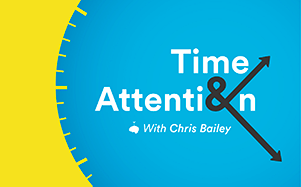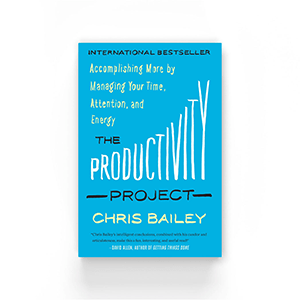
Several months ago, I realized the busyness of work had started to fill my schedule to the brim. With each passing day I was having less and less time to reflect on the state of my work and life.
The negative effects of this period manifested in curious ways. I found it difficult to manage my energy levels, my exercise ritual fell by the wayside, and I began to eat more junk than ever before. At the same time, I started checking my inbox and social media more often so I could keep up with messages—or at least this is what I told myself. Even my meditation and mindfulness rituals began to falter. I felt like I was hunkering down, and yet my productivity was shot and I was working with less intention than ever before.
With so much occupying my days, I had significantly less time to think and reflect. I was working in a reactive way, rather than being thoughtful about how I should spend my time. I knew something needed to change, and that I needed to strike a better balance between thinking and doing.
Lost in a daydream, I thought wistfully of Microsoft co-founder Bill Gates. Twice a year, Bill travels to a cabin in the woods where no one can reach him. Once there, he devours countless papers about the future and plots what to do next in his professional and personal life. He has said this “think week” is when he comes up with his best ideas, and is also how he reflects on the difference he’s making in the world.
This got me thinking: could I pull a Bill Gates? Would a week away from the distractions of everyday life boost my productivity? Would such a ritual allow me to accomplish more overall? Would it let me again work in a way that was less responsive and more intentional?
Last-minute travel deals are made for these precise thoughts, and I soon found myself on a plane to Jamaica to try my very first “think week” ritual.
Though modeled off Bill’s idea, my think week was not nearly as extravagant. Instead of a cabin in the woods with a private chef, I opted for an all-inclusive resort. Instead of reading research papers (which I do most days, anyways), I brought a bunch of books that could help with the problems I was incubating. (If you’re curious, those books were: Thinking in Systems; Joyful; The E-Myth Revisited; and, the odd one out, The Unlikely Pilgrimage of Harold Fry.)
My time in Jamaica wasn’t only about consuming and thinking about information. I also made sure to set intentions for the year ahead, and brainstorm and reflect on a few projects that have been brewing, including new book ideas.
At the end of my seven days I made a list of the five greatest lessons I learned from taking this Bill Gates-inspired think week. These have changed the way I see my own work.
1. The more time you spend keeping up, the less time you spend getting ahead
Keeping up with your daily to do list will only get you so far. The more time you spend focusing on the work that’s already on your plate, the less time you have to think about the projects that you could or should be mulling over. I had fallen into this trap of keeping up—letting my incoming work dictate what I should be focusing on each day.
There’s nothing wrong with keeping up with daily work. In fact, if you’re part of a team, keeping up probably means you’re pretty productive, and might even earn a promotion once in a while. But here’s the thing: you reach a point where keeping up no longer feels like enough.
The more autonomous your work, the more valuable reflection time becomes. Reflecting helps you step back from your work so you can think about new opportunities that are out there, process your challenges, and question what you could be doing differently.
Here are a couple examples. If you’re an executive, your current projects will only last so long—at some point you’ll need to step back and identify new opportunities for your company. If you’re a freelance designer, new clients may approach you, but at a point you’ll probably also need to pitch new projects and think about how you should be spending your time.
You can lose sight of your most valuable tasks and projects when you focus too much on keeping up. This was my problem—I was spending every day replying to emails and planning upcoming talks and consulting commitments. These things are important, but they aren’t everything. My think week allowed me to reconnect with my most important work—writing! It also made me realize I need to say “no” more often and give myself the mental space to plan for the future.

2. We need to strike a balance between reflecting and doing
The busier our lives, the less likely we’ll have the time to step back and reflect on them. We delay a lot of stuff when we’re busy at work. We postpone vacations, spend less time mentally recharging, and just generally spend more time doing rather than reflecting. Being busy makes us feel important and wanted. But it also prevents us from stepping back.
Reflection allows us to place the hypothetical rudder with intent, correcting our course so we can travel in a more productive and meaningful direction. The value of reflection applies to all critical areas of our lives. The more you reflect on your work, the more meaning you’ll find in it, and the less you’ll get caught up on unimportant tasks. The more you reflect on your personal life, the more you’ll start noticing and experiencing moments with your loved ones.
Pre-think week, my time to reflect was running on deficit. In Jamaica I had the chance to reflect on the habits and rituals I value, the meaning I find in my work, and the important relationships I’ve gathered throughout my life. I also had the chance to think about the slightly less pleasant elements—like how much time I had been spending on my email! All of this may have gone unnoticed without the time to reflect.
Heading home at the end of my think week, I doubled down on my good habits that had slipped. I began reading more fiction instead of only non-fiction. I implemented email free days where I turn on an auto-responder and take the day to hyperfocus on my most important work. I also started working out in the morning and took that time to think about the day ahead.
My think week made me realize how badly I needed this reflection time—how much we all do.
3. Stepping back can reveal everything you’re underappreciating
As part of my year-long productivity experiment, I lived in total isolation for 10 days. This experiment was similar to my think week in some ways, and both made me realize how grateful I am for things in my life.
I recognized how lucky I was to have this week to myself, and how I had the privilege of time to think about ideas and plan for the future. I reflected on how grateful I was for my lovely wife, who not only puts up with my weird experiments, but is also my greatest source of happiness. I thought about my family and friends who were more than supportive of the fact that I was disconnecting and would be unavailable for the week. And I gained perspective on how fortunate I was to have this job—that somehow I get paid to run experiments and write about how to become a better human being.
Most importantly, my think week reminded me of a lesson I’m constantly re-learning: that when you step back from your life, you reflect on it. This helps you note what’s truly important and what affects your happiness the most. You also get to see how the different elements of your life are interconnected.
There is immense beauty in this gratitude if you take the time to see it.

4. Our lives need more solitude
Solitude can take many forms. For some, it can be a quiet moment away from the kids. For others, a jog in the park, or a the feeling of peace that comes when you listen to your favorite album.
My preferred definition of solitude comes from Raymond Kethledge and Michael Erwin’s book, Lead Yourself First. They define solitude as a state in which your mind is free from input from other minds.
However you define it, solitude is key to productive reflection. I’m lucky—few of us have the flexibility in our work and home lives to take a full seven-day think week. At the same time, there are ways to bring the values of a think week into your life in general. A trip to Jamaica is not required!
We can do this by finding more solitude in our lives. There are two levels of solitude. The first comes in the form of small blocks of reflection time (waiting in line without your phone, quietly sipping your morning coffee). The second is the extended periods of reflection time where we get to disconnect for the weekend or take a temporary digital detox during a long flight. We need more of both.
Fortunately, there’s often time that can be repurposed for solitude. To pinpoint these moments, ask yourself: when do you mindlessly check through your phone, scroll through social media, or listen to audiobooks and podcasts? When do you do mindless chores like laundry, the dishes, or house cleaning? These are the perfect opportunities to introduce more solitude. Instead of listening to a podcast during your commute, use this time to reflect. Instead of half-watching the TV while doing laundry, try slowing down and letting your thoughts roam free.
Though it was much needed, I sadly didn’t find much solitude at the resort where I did my think week. Turns out a resort is not the best place to free yourself from the inputs of other minds, and lots of folks strike up idle conversation when you’re at a resort by yourself. The few moments of solitude I did have made the entire week worthwhile, though, and they allowed me to deeply reflect.
5. We need think breaks more often
Yes, my think week made me realize I needed more think weeks.
Unless you have an insane amount of flexibility in your schedule, your think breaks probably won’t be a week long. That’s okay! It’s still possible to take one, even if you have a busy life at work and at home. In fact, this is when you’re likely to find the most value in it.
In the next article I’ll be sharing how you can plan a think break of your own. But in the meantime, it’s worth considering how to introduce more thinking and reflection time into your own busy schedule.
When evaluating different strategies for becoming more productive, there’s one yardstick that I always turn to: For every minute I invest into a productivity tactic, how many minutes do I earn back? When you earn your time back—and then some!—a productivity ritual is easily worth the time it takes.
Spending seven days in the sun isn’t the most obvious strategy for becoming more productive. But if you find yourself responding to the daily slog in a reactive way, and that fewer ideas are coming to you as you go about your days, a think break may be exactly what you need.



